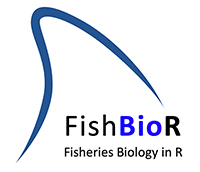2019-10-14 - 2019-11-15 ( )
Form Submission is completed on
Form Submission is completed on

Fisheries Biology in R: Introductory and advanced seminar courses
The Laboratory of Ichthyology, School of Biology, Aristotle University of Thessaloniki (Thessaloniki, Greece), through the Center for Education and Lifelong Learning of the Aristotle University of Thessaloniki, offers two “Fisheries Biology in R” seminar courses (introductory and advanced) to scientists interested in fisheries biology data analysis and stock assessment in data-poor areas.
For more information please visit our website http://fishlab.bio.auth.gr/FishBioR/ or contact us by email (FishBioR@bio.auth.gr) or phone (0030 2310 998279).
Separate registration is required. Both courses are in English.
Course description and deadlines
Introductory Course (14-18 October 2019): Basic methods
An introductory course for scientists interested in fisheries biology methods, data analysis and statistics, basic concepts of stock assessment, as well as stylish graphical presentation of data.
DEADLINE FOR APPLICATIONS: 15 September 2019
Maximum number of participants: 20
Advanced Course (11-15 November 2019): Stock assessment
An advanced stock assessment course for scientists interested in assessment of data-poor fisheries that includes novel methods based on catch and resilience (CMSY), abundance (AMSY) and length frequency data (LBB).
DEADLINE FOR APPLICATIONS: 30 September 2019
Maximum number of participants: 25
Director of the Programme
Athanassios C. Tsikliras
Associate Professor
The aim of the seminar course is to train postgraduate and PhD students but also early career scientists and people already employed in marine fisheries research institutes and management authorities on (a) the methods used for fisheries and biological data analysis using the most sophisticated statistical packages and software (Introductory Course) and (b) the novel methods of assessing the status of stocks of data-poor fisheries using catch and resilience, abundance and length frequency data that have been designed for use in data-poor areas (Advanced Course). Among the objectives of both courses is the stylish graphical representation of data that is required for publishing in international journals and the interpretation of fisheries reference points for ensuring sustainable exploitation of marine populations within the context of European (Common Fisheries Policy and Marine Strategy Framework Directive) and regional legislation.
The courses are aimed for scientists from the Mediterranean and the Black Sea but applications from other areas of the world are welcome.
Introductory Course: Basic methods
An undergraduate degree in Marine Biology, Ecology, Oceanography, Fisheries Science, Aquaculture, Environmental Science, Marine Engineering, Physics, Mathematics, Statistics, Economics and a very good knowledge of English is required.
Knowledge of basic fisheries and fish biology concepts would be very helpful.
Advanced Course: Stock assessment
An undergraduate degree in Marine Biology, Ecology, Oceanography, Fisheries Science, Aquaculture, Environmental Science, Marine Engineering, Physics, Mathematics, Statistics, Economics and a strong background in fisheries and fish biology concepts are required.
A good knowledge of R and R studio and a very good knowledge of English are required.
The courses consist of a morning (9.00-13.00) and an afternoon (14.00-18.00) session, with a lunch break in between (13.00-14.00) and two half hour coffee breaks (10.45 and 15.45).
Introductory Course: Basic methods
DAY 1 – Introduction to R – Importing files – Basic commands
DAY 2 – Length-weight relationships – Growth parameters
DAY 3 – Size at maturity – Gonadosomatic index
DAY 4 – Mortality – Creating beautiful and meaningful plots
DAY 5 – Surplus production models – Examination based on real data
Instructors: Athanassios Tsikliras, Androniki Pardalou, Donna Dimarchopoulou
Advanced Course: Stock assessment
DAY 1 – Introduction to stock assessment methods – Catch-based method
DAY 2 – CMSY: stock assessment using catch and resilience
DAY 3 – LBB: stock assessment using length frequency distribution
DAY 4 – AMSY: stock assessment using abundance data
DAY 5 – JABBA: just another method – Examination based on real data
Instructors: Rainer Froese, Henning Winker, Athanassios Tsikliras, Androniki Pardalou, Donna Dimarchopoulou
Participants are welcome to bring and use their own datasets.
A detailed guide to participants will be available before the course.
ECTS
Introductory Course: Basic methods
Two (2) ECTS will be credited to each participant upon successful completion of course and a certificate of attendance.
Advanced Course: Stock assessment
Two (2) ECTS will be credited to each participant upon successful completion of course and a certificate of attendance.
For more information please visit our website http://fishlab.bio.auth.gr/FishBioR/ or contact us by email (FishBioR@bio.auth.gr) or phone (0030 2310 998279).
In order to secure their place successful applicants are expected to deposit their full fee within a week from their acceptance letter.
Introductory Course: Basic methods
A fee of 250 euros is applied per participant. One full (fees, travel and accommodation) and two partial (fees only) scholarships are available to postgraduate students.
Advanced Course: Stock assessment
A fee of 300 euros is applied per participant. One full (fees, travel and accommodation) and two partial (fees only) scholarships are available to postgraduate students.